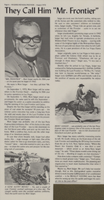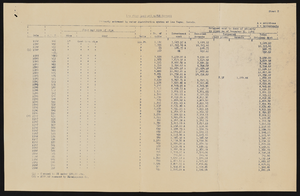Search the Special Collections and Archives Portal
Search Results

Transcript of interview with Hal G. Curtis by Bill Teepe, February 24, 1977
Date
Archival Collection
Description
On February 24, 1977, Bill Teepe interviewed Hal G. Curtis (born 1926 in Galt City, California) about his life in Southern Nevada. Curtis talks first about his work on the Union Pacific Railroad before discussing changes and development in Las Vegas, including development on the Strip and Downtown areas. He also talks about Block 16, the El Rancho Vegas fire, social clubs, and religion.
Text

Transcript of interview with John and Mabel Dillingham by Sonny Le Jeune, March 19, 1978
Date
Archival Collection
Description
On March 19, 1978, John (Sonny) Le Jeune interviewed John (born 1904 in Trail Creek, Idaho) and Mabel Dillingham. The two provide many historical accounts of Las Vegas, Nevada, including John’s work on the railroad, the development of the city, and their living conditions when first moving to Las Vegas. The three also discuss prominent members of the community, recreational activities, church membership, and popular attractions around Las Vegas. Other topics include the building of Hoover Dam, the site of the Stewart Ranch, early irrigation systems, flood control, and Block 16.
Text

Transcript of interview with Irene Doty by Jackie Ogden, March 20, 1977
Date
Archival Collection
Description
On March 20, 1977, Jackie Ogden interviewed Irene Doty (born 1914 in Dangerfield, Texas) about her life in Southern Nevada. Doty first talks about the first casino properties and restaurants in Las Vegas along with some of the other businesses and operations of the area. She also describes some of her experiences as a justice of the peace, conditions during World War II, and the clothing fashion of the time. Doty also talks about some of her experiences in Goodsprings, Nevada, and about her experiences as a juror and potential juror in several murder trials. The interview concludes with a discussion on housing development and gambling in Las Vegas.
Text

Transcript of interview with Murl Emery by James M. Greene, October 18, 1974
Date
Archival Collection
Description
On October 18, 1974, James M. Greene interviewed Murl Emery (born June 7th, 1903 in Bolton, California) at his home in Nelson, Nevada. Also present during the interview is Mrs. Emery and Mr. Dutch Eckhart, a guest who has just arrived to visit with Mr. Emery. The interview covers Mr. Emery’s personal experience in and around Southern Nevada, particularly in the areas from Searchlight, Nevada to Nelson, to Boulder Canyon, but mostly on the Colorado River. Mr. Eckhart also helps to interject some insight into the popularity of the Model T Ford in those days and early days of newly paved roads. Additionally, they discuss water shortage, wells, the building of the railroad, and mining in Nevada. Mr. Emery also discusses the books that were written about his adventurous life, his discoveries and his explorations.
Text

Transcript of interview with John Boyle by Meghan Boyle, March 14, 1981
Date
Archival Collection
Description
Text

Transcript of interview with Roger Thomas by Stefani Evans and Claytee D. White, August 31, 2016
Date
Archival Collection
Description
As he reveals in this oral history, Roger Thomas is, among many other things, a son, a father, a brother, a husband, a student, an artist, a visionary, and a philanthropist. As the second son of Peggy and E. Parry Thomas’s five children, Roger was raised a Mormon child of privilege and civic responsibility. The banking family summered in Newport Beach, wintered in Sun Valley, and taught their children by words and deeds that it is not up for debate if you will be involved in your community; the only question is how you will apply your talents and resources to benefit your community. Roger absorbed the lessons well. As a child who struggled in school but excelled in art, he attended his last two years of high school at Interlochen Arts Academy, graduating in 1969, finally finding himself “in an environment where what I did had currency.” From there he earned his BFA from the School of the Museum of Fine Arts Boston and Studio Degree from Tufts University before returning to Las Vegas and eventually joining Steve Wynn’s team in 1981. As Executive Vice President of Design for Wynn Design & Development, he is the man in whom Steve Wynn places his trust to make real at each Wynn property the Wynn design philosophy: aim for a constituency of highly sophisticated, well-traveled, very educated people and give them a reality, a now, that is so fetching, so alluring they wish to be no place else. As he was mentored by his father and Steve Wynn, he too is mentoring those who will follow him. At Wynn, the next generation will carry forward the Wynn idea of evoca-texture, of creating “moments of experiential emotion that result in a memory so captivating and so unique that if you want to repeat that you have to come back.” At home, he collaborates with his daughter on a children’s book that has the potential to become a series; she is the illustrator, while he provides the words. Roger Thomas sat for this interview five days after his father, E. Parry Thomas, passed away in Idaho. Instead of postponing the interview to a more convenient time, Roger kept the appointment and explained, “This is for UNLV. If I’d cancelled my father would have killed me.”
Text

Transcript of interviews with Louis Wiener, Jr. by Eleanor Johnson, January-February, 1990
Date
Archival Collection
Description
In this multi-part interview, Louis Wiener, Jr. discusses coming to Las Vegas from Pittsburgh at a young age, attending Las Vegas High School and University of Nevada Reno. He attended law school at University of California at Berkeley and passed the Nevada State Bar in 1941. He established a practice, Jones, Wiener and Jones, with Bob Jones and Cliff Jones and later with Herb Jones. He had another practice with Neil Galatz and Dave Goldwater, retiring in 1988. Wiener had other business ventures that allowed him to do pro bono work as a lawyer. Wiener discusses his family, including former spouses, his children, and various aspects of his career as an attorney in Las Vegas, representing hotels in the Greenspun antitrust lawsuit, and as an attorney for Bugsy Siegel. He says of his success, "I'm just lucky. I was here at the right time and I picked the right people to help."
Text

Newspaper clipping, They call him Mr. Frontier, Hughes Nevada Preview, August 1, 1972
Date
Archival Collection
Description
Newspaper article about the Frontier casino executive Mort Saiger from the Hughes Nevada Preview. The article is laminated onto a wooden presentation plaque.
Text
Shar Rednour and Jackie Strano Papers on S.I.R. Productions
Identifier
Abstract
The Shar Rednour and Jackie Strano Papers on S.I.R. Productions (1981-2015) contain the personal and professional papers of Rednour and Strano, two lesbian filmmakers, writers, and activists from the 1990s until the 2010s. The collection contains the personal papers of both Rednour and Strano, including correspondence between the pair before they married in 2006. The collection also contains the professional files of Rednour and Strano in their capacity as creators of SIR (Sex, Indulgence, and Rock and Roll) Video in 1998. Materials include financial documents, correspondence, scripts and editing notes, crew information, publicity photographs, and direct order forms for S.I.R. Productions. In addition to records on SIR Video, the collection also contains a number of sex-positive and lesbian, gay, bisexual, transgender, and queer (LGBTQ) publications from the LGBTQ scene in San Francisco, California during the 1990s.
Archival Collection

